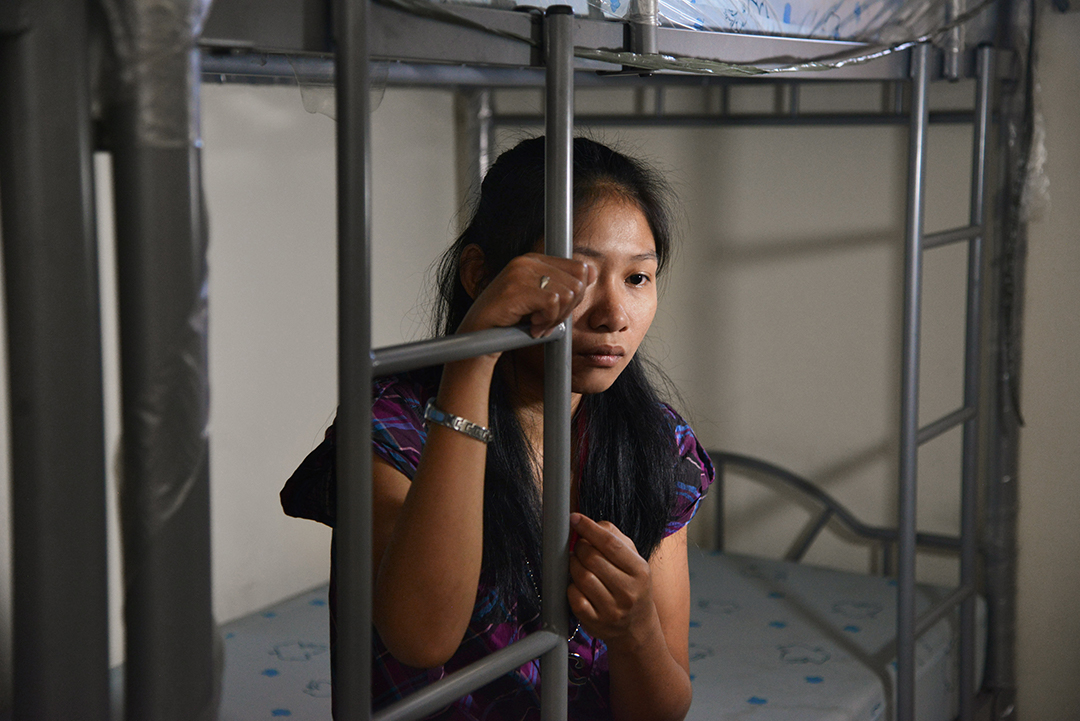
Beth differs from other domestic workers because she was trafficked into someone’s home. Her older sister sold her to a woman and man who lived in Manila, possibly ten hours by bus from where the two girls had lived with an aunt and uncle. She doesn’t remember much from that time. She was 10 years old and was left at the employers’ house in a Manila suburb. On the third day there she was told she had been sold to them. The woman employer began beating her a week after she arrived and never stopped until Beth escaped, seven years later. The woman employer beat Beth with a broom handle almost daily, sometimes five times a day. The house was locked from the inside and the woman never went away. She was the girlfriend of the man who was married to someone else. He lived there until he left the relationship, when Beth was 16. Then the woman began burning her with cigarettes because she blamed Beth for the man leaving. It was “punishment for your sins”, she told Beth. Until her escape at age 17, Beth never went to school, never watched television or listened to the radio. She cleaned the house and took care of the one child, who was 4 years old when she arrived.
***
“My employer gave my sister money. I don’t know how much. After she left she never called. I never saw her again. I learned from my employer my sister had sold me to them. I learned about it after three days. The female employer is a housewife and I don’t know the work of the husband—they lived together but they were not married. It was a four-story house.
“I would wake at 4 a.m. to clean the house. The employer wanted to see the house clean when she wakes up. The employer usually wakes at 7 a.m. After I cleaned the house, I needed to change the clothes of the child. If the employer is not satisfied and thinks the house is still dirty, I need to repeat the cleaning. The laundry was the hardest because I was so little.
“I was not allowed to open the refrigerator. I was not allowed to get food. I would eat the leftover of the employers. If they have no leftover, I would not eat anything. If the dish for lunch had much leftover, they would put it in the refrigerator and not give to me. I would drink hot water so that there was something in my stomach. I was thin. I was small and thin. I never attempted to steal food—my employer knew what food was there. She would beat me for taking the food. She would hit me with the stick of the broom. She would curse at me, saying, ‘motherfucker’. I was hurt more by what was being said to me than her hitting me: She told me she would kill me.
“I was not allowed to go out of the house. It was padlocked. When I escaped, it was the only time I was out. They never went away. If they left the house, they would come back in the evening. I was sleeping on the floor in the room of the child. I was given a blanket to spread on the floor.
“When I was new she was nice to me—only on the first day. She would bang my head on the wall and she would throw hot water on me. She would burn my skin with cigarettes, but I had not done anything bad against them. She said this was the punishment for my sins. She said I have big sins but she never mentioned what they are. She said if I escaped she would kill my parents. She would hit me with the broom, the lid of the pans and casseroles. Almost every day. Sometimes five times in a day. I was usually swollen and sometimes bleeding. Sometimes there was a little blood and sometimes much blood; sometimes I could not move my arm.
“When I turned 17 she bought me a cell phone and a dress. I don’t know why she bought the phone. She taught me how to use it. I escaped when the female employer asked me to buy cigarettes. Then an old lady helped me and brought me to the barangay hall and the barangay officers brought me to the Department of Social Welfare and Development.
“I am in school now, in grade 1. I want to become a nurse and work in a hospital.”
